Android |
Legal System |
I’ve recently become obsessed with visiting the Osaka Kansai Expo. Recently, I received an invitation from a company where I serve as an external director to visit the “Future of Life” pavilion (official website: https://expo2025future-of-life.com/en/) by Professor Hiroshi Ishiguro, who is renowned for his work with androids. This experience made me deeply contemplate legal issues.
While this might be a slight spoiler, the exhibition presents a future where humans can become androids. It features a story of a grandmother and granddaughter who are close to each other. As the grandmother’s health deteriorates, she faces a choice: to die naturally or to continue living through androidization. The pavilion also features numerous other androids, creating an exhibition that makes visitors contemplate what “life” truly means. I should note that while I have visited over 40 pavilions so far, the “Future of Life Pavilion” is particularly recommended among them!
This raised a legal question for me as a lawyer. If humans could transfer their consciousness and memories to androids and “continue living” for 100, 500, or even 1,000 years beyond their biological lifespan, what stance should the law take? Specifically, can we legally treat the original human and their post-androidization existence as the same legal person?
An android gazing at itself in a mirror – can it truly be called “the former me”?
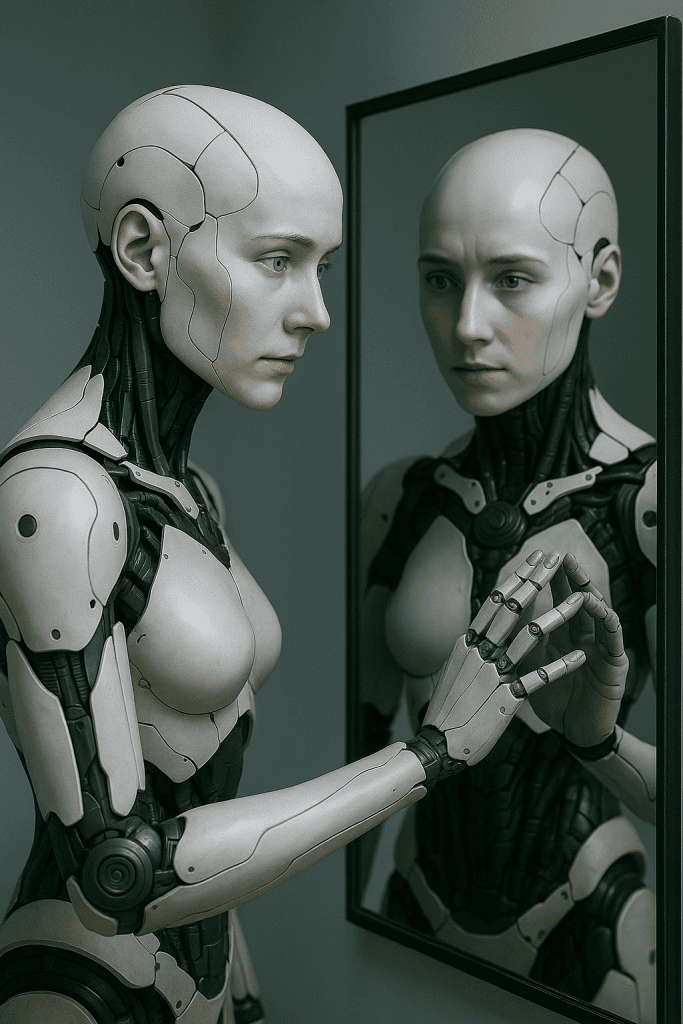
Under the laws of most countries today, a person acquires rights at birth and loses them upon death. This fundamental principle of “biological death = extinction of legal personality” has been the foundation of legal systems worldwide for hundreds of years.
However, if technology enables consciousness and memories to be electronically preserved and transplanted into a different body (an android), this principle would face fundamental reconsideration. How should the law treat an existence that is biologically dead but whose personality and memories continue?
Note: This paper discusses androidization through digital transfer of consciousness and memory, not physical brain transplantation. It also distinguishes from cyborgization (replacing parts of living organisms with machines) and deals with complete personality transfer to an artificial body.
Legal approaches to this problem can be broadly divided into four categories:
This position treats the android as a “thing” without legal capacity once the physical body perishes and legal personality ends. From the standpoint of current law, this would basically be the prevailing view.
The android would be owned by heirs as inherited property, and the original human’s rights and obligations would be processed through normal inheritance procedures. In this case, the inheriting grandchild would own grandmother’s android as a “thing,” making it legally possible to sell it on marketplace apps or dispose of it as bulky waste – a result that borders on dark humor.
While legal stability would be maintained, the motivation to choose androidization would be significantly undermined. Few people would actively desire androidization if they might be treated as “things” subject to sale or disposal. Moreover, since they would lose all property rights and contractual status, they would be completely severed from the social positions and relationships they had built.
Is grandmother just a “thing”?

This position emphasizes the continuity of memory, personality, and self-consciousness, treating the android as the same legal subject as the original human. In this case, property rights, family relationships, and contractual status would all be inherited as-is, and the person would be treated as “living” in the family registry.
While this would be the most desirable outcome for the individual, the impact on the entire legal system would be enormous.
This position recognizes personality in androids, but the android is registered as a completely new legal subject, while the original human’s rights and obligations are processed through normal inheritance procedures.
From this standpoint, the android would begin a new life from zero as a “newly born adult.” While freed from past entanglements, they would also lose the human relationships and social status they had built.
This is a compromise position that allows succession of only certain rights through special legislation. For example, a system could be designed where personal rights and family relationships are inherited, but property rights go through inheritance procedures.
Specifically, personal rights such as name rights and portrait rights, status relationships as spouse or parent-child, and support claim rights would be recognized for succession, while property rights such as real estate ownership, stocks, and deposits would still require traditional inheritance procedures.
The significance of this Limited Succession Theory lies in legally protecting the emotional connections of families and personal identity while ensuring the stability of socioeconomic systems. It can legally guarantee, albeit limitedly, the continuity of human relationships that would be lost through complete severance.
Comparison of Legal Positions on Androidization
| Item | Non-Personality Theory | Personality Continuity Theory | New Personality Theory | Limited Succession Theory |
| Basic Concept | Personality ends with physical body demise, treated as a property | Emphasizes continuity of memory and personality | Grants personality as new legal subject | Certain rights only succeed through special law |
| Legal Status | No legal capacity (treated as property) | Continues as same personality | Newly created legal person | Limited rights subject |
| Property Rights | Processed through inheritance | All succeeded | Processed through inheritance | Goes through inheritance procedures |
| Personal Rights (name, portrait, etc.) | No succession | All succeeded | Newly acquired | Partially inheritable |
| Family Relations | Treated as family asse | Continues | Newly established | Continues |
| Family Registry Treatment | Death certificate filed, registered as property | Continues as living | New birth certificate | Special registration system |
| Inheritance Tax | Taxed normally | Not taxed | Taxed normally | Only property portion taxed |
| Benefits to Individual | Minimal (treated as property) | Maximum (all rights continue) | Small (new life but no rights) | Moderate (personal rights protected) |
| Social Impact |
Minimal (maintains current system) | Enormous (fundamental system change) | Moderate (family registry expansion) | Moderate (partial system change) |
| Feasibility | Easiest (current law as-is) | Difficult (fundamental legal reform) | Somewhat difficult (new system creation) | Moderate (special legislation) |
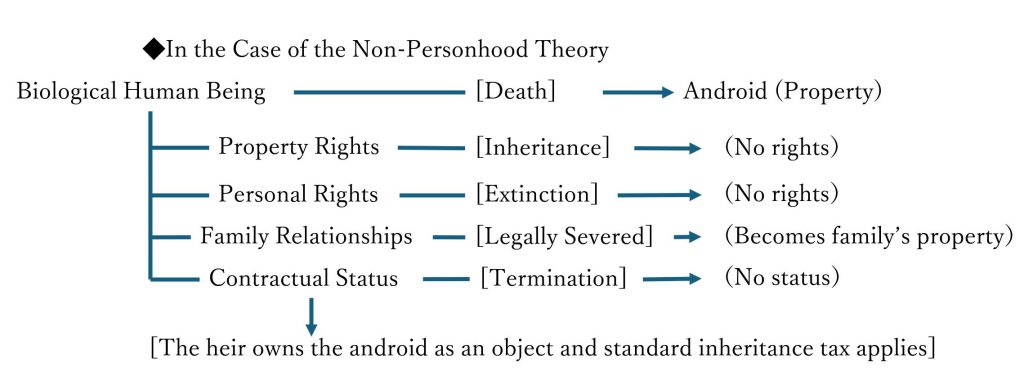
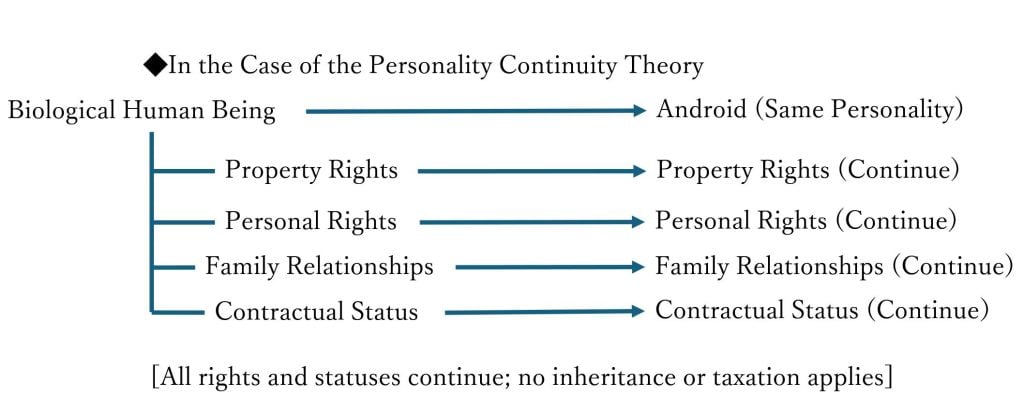
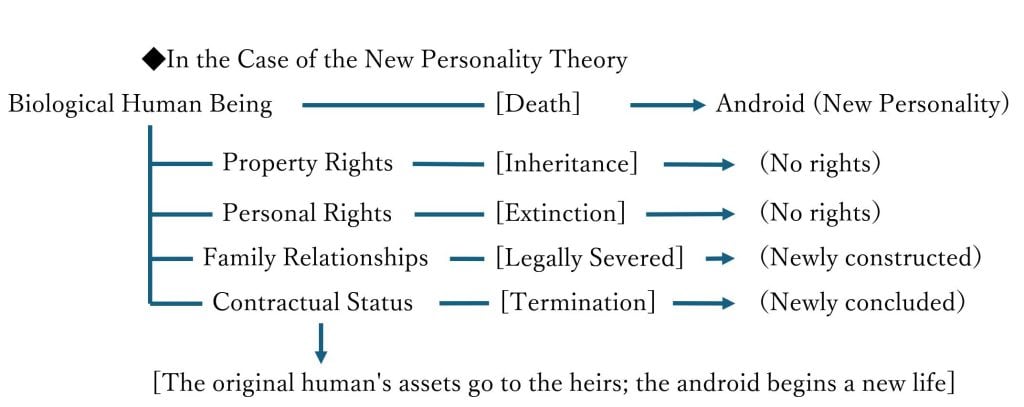
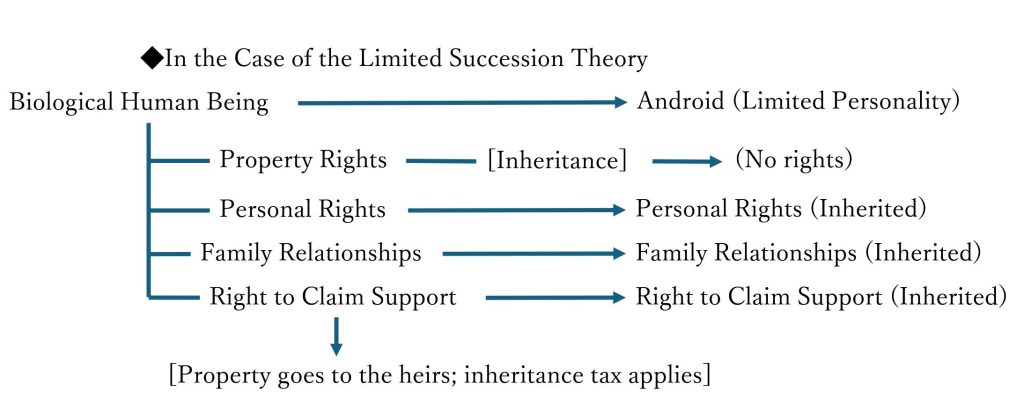
Would current legal systems function when androidization allows humans to live for 1,000 years? If androidization achieves effective immortality, many current legal systems could become dysfunctional.
The inheritance system would fundamentally change. If people don’t die, inheritance doesn’t occur. As a result, assets like real estate and stocks would be permanently occupied by the same individuals, severely impeding social fluidity.
Contract relationships would also become abnormally long-term, potentially causing rigidity in the entire socioeconomic system.
If one spouse becomes an android, what happens to the marriage relationship? Since the androidized spouse is legally “living,” the other spouse’s remarriage would raise bigamy issues.
Parent-child relationships would also become complex. The relationship between androidized parents and subsequently born children, and the scope of support obligations across generations – these are problems traditional family law never anticipated.
The penal system would require fundamental revision. The meaning of life imprisonment would be relativized, and consistency with statute of limitations would become problematic. The concept of “rehabilitation potential,” one of the foundations of punishment, would also change significantly when premised on lifespans of hundreds of years.
Would democracy remain viable if immortal beings continued to hold political power? The impact extends beyond legal issues to affect democratic institutions themselves.
In a society where only the wealthy can choose androidization, they would continue exercising political and economic influence for hundreds of years. An “immortal elite class” with voting and candidacy rights could monopolize decision-making, impeding social renewal through generational change. As Piketty pointed out that “the return on capital exceeds economic growth rate (r > g),” the phenomenon of wealth accumulation and expansion could be further accelerated by the perpetual androidization of the ultra-wealthy.
Pension systems, healthcare systems, and education systems – current social security systems are designed based on average human lifespan. These systems would also require fundamental revision.
[Column: The Multiple Android Problem – Who is the “Real” One?]As technology advances, multiple androids could potentially be created simultaneously from one person’s consciousness and memory. For example, suppose there exists “Android 1” created from Person A’s memory transfer and “Android 2” later restored from a backup. Furthermore, if biological Person A is still alive, we would have a three-way coexistence of “Person A + Android 1 + Android 2.” In such cases, the following legal problems would arise: ◆ Identification of Rights Holders
◆ Property and Contractual Confusion
◆ Overlapping Family Relationships
Such problems could fundamentally shake legal systems in a future where single personalities can be digitally “replicated.” While current law doesn’t anticipate such situations, “uniqueness guarantee,” “identity authentication,” and “centralized management of digital personalities” might be required as premises for future system design. |
“I’m the real one!”

How should our legal system evolve to address such a future society?
This would establish a new family registry system specifically for androids, recognizing personality succession based on clear expressions of intent made during one’s lifetime. The scope of inheritable rights would be clearly defined in written law to ensure legal predictability.
Digital Personality Registration System Process Flow
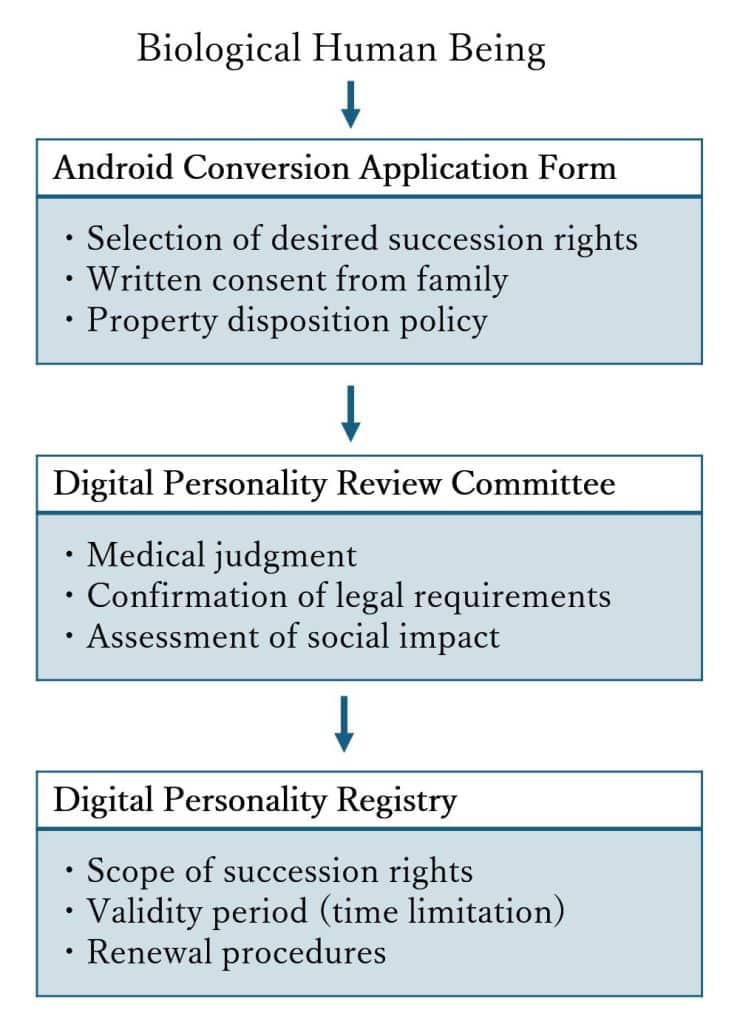
To ensure social fluidity, this system would limit personality succession to a specific period (for example, 50 years). After the period expires, mandatory status transfer would occur, legally guaranteeing generational change.
This would create “Android Corporations” as entities between individuals and corporations, recognizing limited legal personalities that inherit only specific rights. This system aims to balance continuity of social roles with legal stability.
As background, I previously worked as a financial lawyer creating Charitable Trusts in jurisdictions like the Cayman Islands and establishing corporations with no shareholders. Even if android personality rights were restricted, it might be possible to create a system where companies and foundations are established, all assets transferred to them, and the android embodiment directs these entities. This could potentially enable survival while maintaining assets for 1,000 or even 2,000 years.
By applying such existing legal schemes, we could potentially achieve substantial rights succession after androidization. We may need to consider whether such schemes should be prohibited.
Android Substantial Rights Holding Structure (Cayman Islands-type Scheme Example)
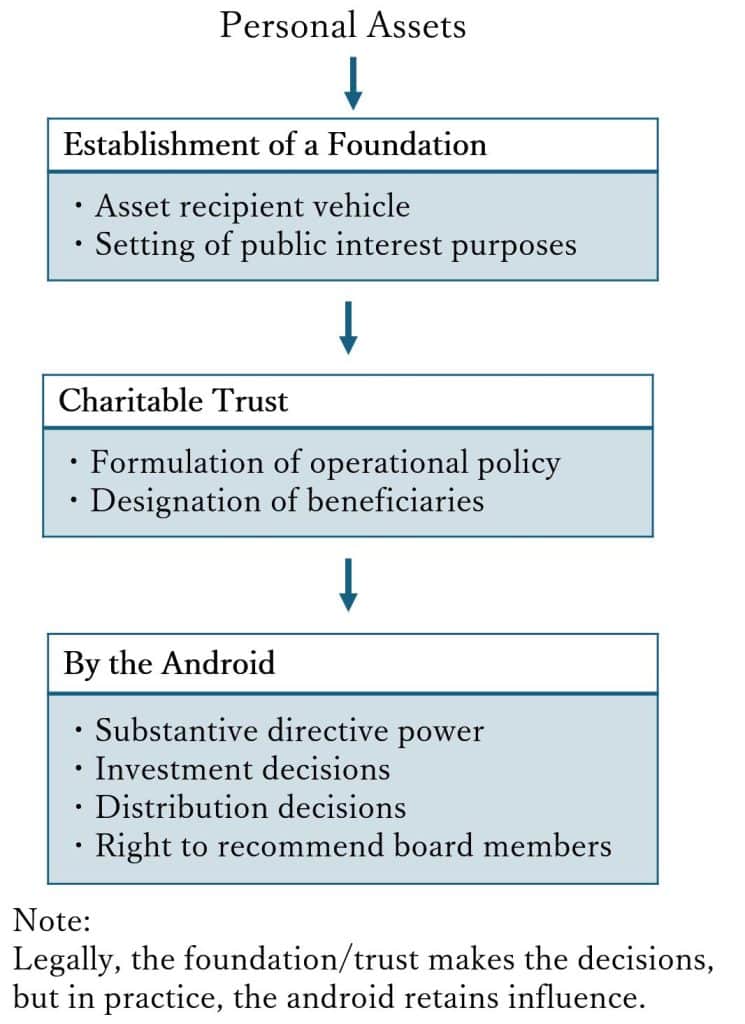
[Column: Can AI Be Granted Legal Personality? – Legal Status of “Bodiless Intelligence”]When discussing personality succession through androidization, another intriguing question emerges: “Can pure AI (artificial intelligence) be granted legal personality?” ◆ However, Could This Apply to “Memory-Holding AI”?Meanwhile, systems like “memorial AI” that learns a person’s voice, speech patterns, and values, or “Digital Executor” AI that realizes posthumous wishes, are progressing as real technological challenges. ◆ Direction for Legal Organization
Thus, AI and androids are fundamentally different in their “nature of personality” and “legal roles.” While this paper focuses on “how to inherit personality,” the separate question of “whether to grant personality to new intelligence” will also be an unavoidable issue in future legal system design. |
If such technology becomes reality, significant changes will be required in legal practice. New legal service demands will emerge, including preparation of lifetime intent documents regarding androidization, establishment of digital asset management and succession contracts, and support for family consensus building.
The legal profession will also urgently need to establish ethical codes responding to new technologies and continuous training systems.
Humans as Digital Information

What I felt from viewing Professor Ishiguro’s exhibition was the magnitude of technology’s impact on legal systems. While the issue of personality succession through androidization remains in the realm of thought experiments at present, considering the speed of technological development, this is an area where the legal profession should begin discussions early.
Legal studies must find answers to fundamental questions: What is humanity? What is personality? What is the individual’s position in society? In an era where technology transforms society, new challenges await legal professionals.
Note: This paper represents the author’s personal views as part of thought organization and does not predict or guarantee future legal systems. While Saito is somewhat positive about androidization, there is absolutely no intention to encourage readers to “please become androids!”